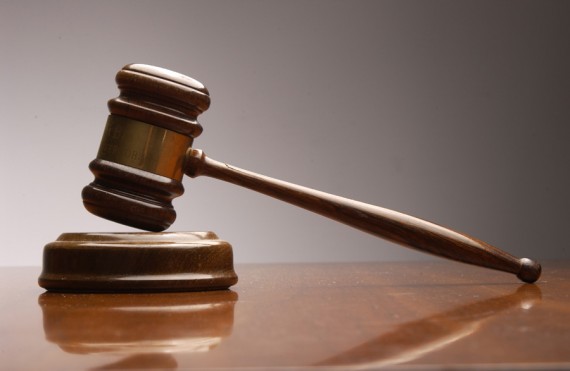Three Iowa Justices Ousted Over Gay Marriage Ruling
Three of the Justices who ruled in favor of same-sex marriage in Iowa have been removed by the voters. That strikes me as the beginning of a dangerous trend.
In the states that have them, judicial elections are usually pretty staid affairs. Quite often, a sitting judge running for re-election isn’t strongly opposed, and, usually, they’re re-elected. That’s one reason why the news that three members of the Iowa Supreme Court were voted out of office yesterday is so surprising:
Three Iowa Supreme Court justices lost their seats Tuesday in a historic upset fueled by their 2009 decision that allowed same-sex couples to marry.
Vote totals from 96 percent of Iowa’s 1,774 precincts showed Chief Justice Marsha Ternus and Justices David Baker and Michael Streit with less than the simple majority needed to stay on the bench.
Their removal marked the first time an Iowa Supreme Court justice has not been retained since 1962, when the merit selection and retention system for judges was adopted.
The decision is expected to echo to courts throughout the country, as conservative activists had hoped.
“It appears we’re headed for a resounding victory tonight and a historic moment in the state of Iowa,” said Bob Vander Plaats, the Sioux City businessman who led a campaign to remove the justices because of the 2009 gay marriage ruling. “The people of Iowa stood up in record numbers and sent a message … that it is ‘We the people,’ not ‘We the courts.’ ”
In a statement issued early today, the three justices said: “We hope Iowans will continue to support Iowa’s merit selection system for appointing judges. This system helps ensure that judges base their decisions on the law and the Constitution and nothing else. Ultimately, however, the preservation of our state’s fair and impartial courts will require more than the integrity and fortitude of individual judges, it will require the steadfast support of the people.”
Not everyone agreed with Vander Plaats or the majority of voters.
“In the end, the aggressive campaign to misuse the judicial retention vote, funded by out-of-state special interests, has succeeded,” Drake University Law School Dean Allan Vestal said. “The loss of these three justices is most unfortunate, and the damage to our judicial system and the merit selection of judges will take much to repair.”
Ternus, Streit and Baker will remain on the bench until Dec. 31.
Justices serve staggered, eight-year terms. David Wiggins is up for retention in 2012; Mark Cady, Daryl Hecht and Brent Appel face voters in 2016.
Under Iowa law, Supreme Court Justices are required to stand for a retention election every eight years, which is essentially a referendum on whether or not the individual Justice should continue to serve. If they “yes” vote wins, the Justice serves another either years, if not then a new Justice would be appointed by the Governor and stand for a retention election within a year after appointment.
Over at The Volokh Conspiracy Todd Zywicki doesn’t seem to think that this is a big deal:
In Federalist 51 Madison defined the fundamental challenge of constitutional government: “In framing a government which is to be administered by men over men, the great difficulty lies in this: you must first enable the government to control the governed; and in the next place oblige it to control itself.” There is no solution to this, just a tradeoff. You can increase the independence of elected officials, which makes it easier for the government to control the governed by insulating them from majoritarian and interest-group pressures. But if you increase independence you run the risk of increased agency costs when the government is unable to control itself-when politicians (including judges) pursue their own self or ideological interest instead of the purposes for which they are given independence in the first place. And vice-versa: more democratic control will make politicians more responsive to the governed but also reduce the risk of agency costs.
Iowa has set up one system that tries to balance this. If the voters of Iowa concluded that the Justices of the state Supreme Court abused their power in creating a right to same-sex marriage, and that this represents the Justices reading their own ideological views into the law, then it is entirely appropriate for them to toss some or all of the offending Justices. That’s not a “misuse” of the retention power; that’s what it is there for.
Whether Iowa has struck a proper balance between independence and accountability, or should balance it in some other way is a different question.
It seems to me, though, that it is the more important question.
I have had doubts about the idea of subjecting judges, especially judges at the appellate court level, to electoral politics. The Judiciary works best, I think, when it is insulated from the political process as much as possible. At the Federal level, that is accomplished by giving Federal judges at all levels life tenure, with the exception of judges serving on certain courts that fall outside Article III of the Constitution. It’s not necessary to go that route, however, in order to shield the judicial process from the whims of popular politics as much as possible. Here in Virginia, for example, judges are appointed by the state legislature and subject to a retention vote by both bodies every eight, or in the case of the Supreme Court twelve, years. A system like this allows for a retention vote without exposing judges to the whims of a direct popular vote as in Iowa.
At the other end of the extreme, of course, are states like Alabama where judges at all levels are subject to contested races on a regular basis. The consequences of that have included massive contributions from trial lawyers, which has resulted in Alabama being one of the most pro-Plaintiff states in the country, and the presence on the court of men like former Chief Justice Roy Moore. Clearly, Alabama’s experience shows that there is a point at which popular will and special interests can have an undue influence on the judicial process just like they can over the legislative process.
There’s more to this than the process by which judges are selected, though.
At some level, it strikes me as inappropriate for a judge to be removed for office based solely on the fact that some segment of the public doesn’t agree with a single decision that they made. When a court is acting in it’s role as the protector of minority rights, it’s inevitable that the majority isn’t going to like it. The idea that they would then be able to turn around, oust that Judge, and replace him with someone who would rule the other way does serious damage to the entire notion of individual and minority rights. This is the reason, in the end, that an independent judiciary is a good thing, and it strikes me as a bad thing that we could be entering an era when judges at the state level would be subject to the whims of a vocal political group.
Hopefully, these losses in Iowa are not the beginning of a trend.







A similar effort to kick an Illinois Supreme Court justice off the bench by the medical malpractice industry failed yesterday. (See Chief Justice Thomas Kilbride)
I personally agree with Zywicki. These justices were making over $160,000, plus retirement benefits. Good for them for standing for a principle, but I don’t know why people these days feel that principles should be cheap.
Oh yeah, I hate Roger Taney.
Its actually highly ironic. The same people who claim to want judges to adhere strictly to a text, rather than use a judgment that is attuned to an evolving society, are now crowing about winning a victory that will greatly incentivize judges to stick their fingers into the political winds when they make their rulings, if they want to keep their jobs.
In the early ’80’s, Californians removed a number of state supreme court justices because of a single issue. It didn’t start a trend then and I doubt this will start a trend now. Were I am Iowa voter, I would have voted to approve all three, but I’m not and those that opposed the three were exercising their rights granted under their state constitution.
State Republicans took over the State House last night and are vowing to pass a constitutional amendment adding discrimination into our constitution now as well. Fortunately that process is a fairly long and drawn out one but I could be seeing myself relegated back to second class citizenship with in about 3 years. It’s really kind of frustrating and it’s far past time that fights like these should be unnecessary in this country.
a victory that will greatly incentivize judges to stick their fingers into the political winds when they make their rulings, if they want to keep their jobs.
Tano;
I can clearly see your point and it is well taken, the only question is whether they were removed for doing just that, instead of objectively following the law.
This just sounds like opinions will be formed according to who’s ox is being gored.
The sausage-making of judicial elections is rarely pretty, even when such issues are not involved. This bad for people with weird names and good for bagel-makers.
Ken, I think there is a better argument for protecting trial judges from politics than appellate court judges. Appellate judges make policy. Trial judges make rulings on the evidence before them. If a trial judge frees a murder because of the evidence he or she heard, I think that’s one thing. If an appellate court rules the death penalty unconstitutional, it’s another.
PD, I think that is a perfectly rational argument. My point was only that judicial elections in general are troubling.
Anyway, at least in California, there are other methods by which unpopular judges are brought into line. California allows litigants to disqualify one judge as a matter of right — no questions asked — in any civil or criminal case. Certain district attorneys notoriously instruct their troops to blanket-disqualify judges who make unpopular rulings — like giving too light of a sentence or suppressing evidence.
“When a court is acting in it’s role as the protector of minority rights, it’s inevitable that the majority isn’t going to like it. ”
I thought the role of the courts was to interpret the law and, in this case, it’s constitutionality. Who the hell suddenly made them protectors of the great unwashed???
Ah, don’t be an idiot, McGuire.
Re: I thought the role of the courts was to interpret the law and, in this case, it’s constitutionality.
Well, yes,and that was in fact what they did. Here is a thoughtful piece with an interesting historical background, written last month by Michael Gartner, former editor of Des Moines Register, former president of NBC News, and current owner of the Iowa Cubs AAA baseball team:
http://www.dmcityview.com/2010/10/21/features/
“…the only question is whether they were removed for doing just that [putting fingers to the wind], instead of objectively following the law.”
First off, I don’t really see any evidence that they were just being opportunistic. There is a very considerable percentage of the population that sincerely believes the way these judges seem to believe. And besides, it doesn’t take a rocket surgeon to figure out the way the winds blow on this issue in Iowa. If they were being opportunistic, they were pretty dumb about it.
I also would disagree with your statement about “objectively following the law”. No human has the ability to see objectively. Judging requires judgment. That is the whole point of being a judge. Constitutions routinely utilize such language as “equal protection under the law”. What the hell does that mean, exactly. In a rough sense, we can all agree what it means. But what about in some particular case? Does it mean the state is forbidden from denying marriage to gay couples? Or is that kind of inequality allowed somehow? Or maybe some think it isn’t even unequal. There are no really “objective” answers to questions like this.
I’m sorry but I find the usual conservative argument about strict readings of the constitution to be deeply incoherent. There are no explicit answers in Constitutions as to how Constitutional principles must be applied in highly complicated specific cases. That requires judgment, which seems to be a dirty word in modern-day conservative judicial philosophy.
Doug Mataconis: “At some level, it strikes me as inappropriate for a judge to be removed for office based solely on the fact that some segment of the public doesn’t agree with a single decision that they made.”
Yeah, fascism is blithely fickle in that respect. Who’da thunk, eh?
> Who the hell suddenly made them protectors of the great unwashed???
If not them, then who?
Well Patrick, maybe when the right gets done stomping on gays and Hispanics, you can see about turning back the clock an getting black folks kicked out of restaurants and sent to the back of the bus. Where is it written that America is about equality, right?
This is exactly why popular election of judges is a TERRIBLE idea. The whole reason why we have fundamental rights is to protect us all from the tyranny of the majority. If the majority can vote out judges for protecting those rights, then judges will be less vigilant in the future.
“Who the hell suddenly made them protectors of the great unwashed???”
The Founders, though I concede it might have been accidental.
More to the point, all the cases of judges being removed by the electorate involve TONS of out-of-state money backing the removal effort.
The great irony of this last case is that the ad which probably put them out of office pointed out that the closest other court which agreed with the Iowa court was over 1,000 miles away. That ad was bought and paid for with contributions from even further away, I suspect.